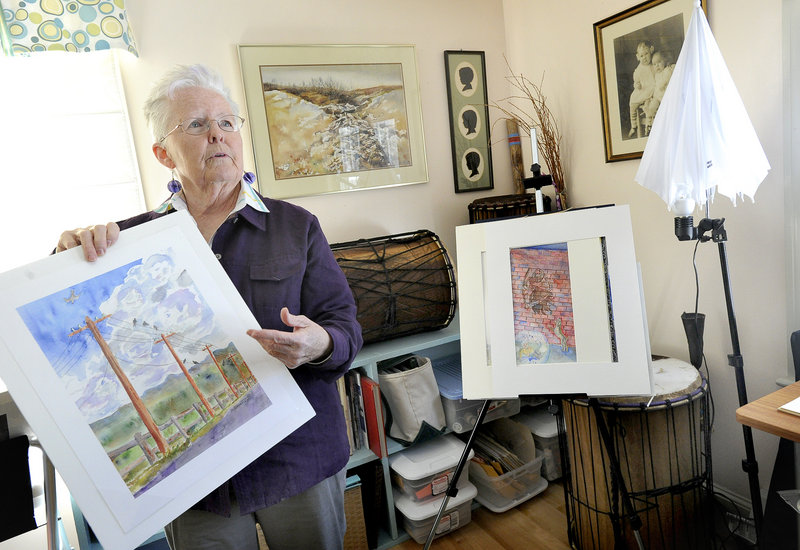Faced with a rising toll on families and on taxpayers, Congress is calling for a national effort to confront Alzheimer’s disease.
A bill co-sponsored by Sen. Susan Collins, R-Maine, would create a national panel to coordinate Alzheimer’s research, treatment and care, similar to efforts aimed at cancer and AIDS. Both the House and Senate overwhelmingly approved the bill last month, and President Obama is expected to sign it as soon as next week.
“There was no plan, no coordination,” Collins said from her home in Bangor this week. “Our research is grossly underfunded.”
Collins said the government spends less than one penny on research for every dollar spent on caring for people with the disease.
“That simply makes no sense at all,” Collins said. “If we can lower the incidence of Alzheimer’s or delay the onset of Alzheimer’s or improve the treatment of Alzheimer’s, we will end up saving the Medicare and Medicaid programs billions of dollars.”
The number of people who experience the dementia and physical decline caused by Alzheimer’s is expected to grow exponentially now that the first of the baby boom generation is about to turn 65 years old. Risk of getting the disease rises with age, although some people are now diagnosed in their 40s or 50s.
Alzheimer’s is already taking a toll on 5 million Americans and their families, including more than 30,000 people in Maine. The numbers are expected to triple over the next 40 years.
Kathryn Pears, director of education and public policy for the Maine Chapter of the Alzheimer’s Association, praised Collins for leading the effort in Congress and said it is especially important in Maine, which has one of the fastest growing elderly populations in the nation. About two-thirds of Maine’s nursing home residents have Alzheimer’s or related dementia, she said.
“It’s the first time we’ve seen Congress really sort of stand up and say Alzheimer’s is a public priority. It’s really the coming health crisis of the 21st century,” Pears said.
Without improvements in treatment and care, she said, “we will bankrupt not just the national Medicaid and Medicare systems, we will bankrupt our own state Medicaid system.”
The bill co-sponsored by Collins would create the National Alzheimer’s Project, an interagency group that would coordinate federal spending and policies targeting Alzheimer’s. The panel would present an annual report on federal activities and recommend changes. The bill doesn’t include any more money for research into risk factors and treatments, but it is expected to improve coordination of ongoing research and, eventually, lead to additional studies.
“I really think this is legislation that’s going to matter for a lot of families,” Collins said.
Collins has been a long-time leader of congressional efforts to fight Alzheimer’s and years ago helped create a bipartisan task force that recommended a new national Alzheimer’s panel.
“Alzheimer’s, regrettably, is very common in my family. My grandfather and uncle died from it, and numerous cousins have died from it,” she said.
Collins said many of her colleagues in Congress also had direct experience with “just how devastating the disease is, not just for the victims but for the members of the family.”
Congress also clearly saw that the financial burden of the disease is not sustainable, according to Collins. It cost Medicaid and Medicare $170 billion to care for Alzheimer’s patients last year and will cost $800 billion a year by 2050, she said. “This is a potential ticking time bomb for our country.”
Donna Beveridge of Saco, a retired teacher who was diagnosed with Alzheimer’s three years ago at age 65, said she hopes federal efforts will raise awareness about Alzheimer’s and lead to new treatments. But she is not holding out hope for herself.
“I don’t think there’s going to be a cure for me,” she said. “I hope for people in general that there will be something found that can help prevent it or ease the symptoms.”
Beveridge said a positive outlook and early treatment have helped her stay active and cope with early-stage symptoms, such as days when she lacks energy or has a “fuzzy head.” She began painting after her diagnosis and recently exhibited her art in Brunswick as a way to raise awareness about Alzheimer’s and show that people are living, and not just dying, with the disease.
“I can still be a teacher,” she said. One of her watercolors, for example, shows a woman crawling with a turtle shell on her back. “Life seems to be moving faster and faster and I’m going slower,” she said. “This is a reminder to keep going.”
Karen Stram of Dresden said she also knows the new federal effort won’t lead to any new treatments for her husband, Bob, who was diagnosed 14 years ago at age 56.
Stram testified in Congress about how she cared for her sick husband for nine years, and worked with Collins’ office to pass the bill. He now lives at the Maine Veterans Home in Augusta.
“It’s 24-7 caregiving,” she said, “He went from him being forgetful and not being able to pay a restaurant tab to being in a wheelchair and having to be moved physically with a lift.”
Stram said she is hopeful that Collins’ efforts and the new federal focus will help families like hers in the future, and contain the costs of caring for an increasing number of patients.
“There is nothing that is going to help my husband. My biggest concern is the people who have not yet got diagnosed with the disease and their having to face it,” she said.
“The bottom line is that, for society, the costs are going to be overwhelming.”
Staff Writer John Richardson can be contacted at 791-6324 or at: jrichardson@pressherald.com
Send questions/comments to the editors.




Success. Please wait for the page to reload. If the page does not reload within 5 seconds, please refresh the page.
Enter your email and password to access comments.
Hi, to comment on stories you must . This profile is in addition to your subscription and website login.
Already have a commenting profile? .
Invalid username/password.
Please check your email to confirm and complete your registration.
Only subscribers are eligible to post comments. Please subscribe or login first for digital access. Here’s why.
Use the form below to reset your password. When you've submitted your account email, we will send an email with a reset code.